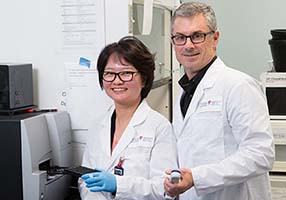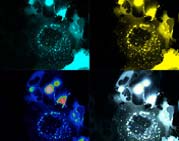
Breadcrumb
- News and Events
- News
- Content
- Innovative biosensor technology reveals secrets of how drugs work
null Innovative biosensor technology reveals secrets of how drugs work
 What if we could take advantage of a drug’s benefit without side effects? Stéphane Laporte, PhD is conducting research in his laboratory at the Glen site of the Research Institute of the McGill University Health Centre to find out. How? By tracking a class of proteins in the human body called G protein-coupled receptors (GPCRs). GPCRs are involved in the progress of many diseases and a common target for drugs, but the mechanisms behind them remain mysterious to many scientists.
What if we could take advantage of a drug’s benefit without side effects? Stéphane Laporte, PhD is conducting research in his laboratory at the Glen site of the Research Institute of the McGill University Health Centre to find out. How? By tracking a class of proteins in the human body called G protein-coupled receptors (GPCRs). GPCRs are involved in the progress of many diseases and a common target for drugs, but the mechanisms behind them remain mysterious to many scientists.
His team - along with colleagues at McGill University, at the Institute for Research in Immunology and Cancer (IRIC) at the Université de Montréal (UdeM), and Université de Sherbrooke - has developed an innovative technology based on biosensors that target GPCRs to identify safer, more effective molecular therapies.
 In a recent publication in the prestigious journal Science Signaling, Stéphane Laporte and his colleagues used the biosensors technology to identify new drug pathways on angiotensin II, an important receptor which controls vascular tone. Their findings will assist the development of new drugs for the treatment of heart failure, a chronic condition that affects the pumping power of heart muscles.
In a recent publication in the prestigious journal Science Signaling, Stéphane Laporte and his colleagues used the biosensors technology to identify new drug pathways on angiotensin II, an important receptor which controls vascular tone. Their findings will assist the development of new drugs for the treatment of heart failure, a chronic condition that affects the pumping power of heart muscles.
The potential of these biosensors is so significant that a team from the Karolinska Institutet in Sweden has also used them to identify a new family of receptors - named ‘Frizzleds’ - as a possible target for treating cancer, cystic fibrosis and cardiovascular disease.
“I'm happy about these achievements made possible through the work of my team and our many collaborative efforts over the years,” says Stéphane Laporte. “The interest from academic institutions and pharmaceutical industry is indicative of the leadership and expertise of our laboratories and collaborators at McGill, UdeM, and Université de Sherbrooke in the field of biosensors. The fact that all this is being done in Quebec makes me all the more proud.”
The Quebec-based researchers expect new, targeted drugs to be available within five to ten years.
Learn more about their innovative research
—published December 14, 2018